
 |
|
Sunday, December 11, 2005
Race Riots in Sydney
Violent mob attacking people in race riots in Australia! Look at that picture! I can't even begin to understand what is going on here.
Permalink Post a Comment
Saturday, December 10, 2005
The Mighty Pen
British Playwright Harold Pinter has won the Nobel Prize for literature for 2005. I was not really aware (or interested) in this fact until I stumbled across part of his acceptance speech, which can be found in full at the first link. To say he is a little anti-war and anti-American would put it mildly. A snippet of his highly interesting writing: The crimes of the US have been systematic, constant, vicious, remorseless, but very few people have actually talked about them. You have to hand it to America. It has exercised a quite clinical manipulation of power worldwide while masquerading as a force for universal good. It's a brilliant, even witty, highly successful act of hypnosis.Strong words indeed and with added benefit of being spoken from a such a notable platform as the Nobel Organisaiton. North Korean Human Rights Blogger nomad, Andy Jackson, has been updating events from the Seoul Summit on North Korean human rights. By all accounts this was a pretty big event. The BBC has also reported on the event. I had a friend staying at the Shilla during the week for an unrelated conference and told her to go in and take any propagandada they might be handing out but said it was packed. I don't think she got any stuff for me. And just a quick boast that I am leaving winter behind and heading south to wonderfully sunny Australia in less than a week to spend Christmas at home! Sunday, December 04, 2005
Made in Korea Nautilus has a copy of a recent Joong Ang Ilbo opinion piece regarding the tricky matter of labeling goods produced in the Kaesong Industrial Complex. The article discusses the dilemma of whether to label products as "made in South Korea" or "made in North Korea. If the former, then they can enjoy better status and access to world markets than a "made in North Korea" tag. However, the decision is not just a choice but a matter of legality. As a 2004 op-ed piece by Marcus Noland notes: North Korea is among the few countries that the United States does not grant normal trade relations (NTR) status to, and North Korean exports are subject to the so-called column 2 tariff rates established by the infamous Smoot-Hawley Tariff Act of 1930. These tariffs tend to be the highest on labor-intensive products such as garments, in which North Korea is conceivably competitiveEven the EU and ASEAN which originally agreed to treat the products from Kaesong as South Korean are now having second thoughts. As the article notes: Last month, some members of the Association of South East Asian Nations refused to recognize products from Kaesong complex as made-in-South Korea. ASEAN said that under World Trade Organization regulations, the origin of the country must be the place where the industrial process was completed. They said it is difficult to consider products made in North Korean territory as having been made in South Korea.Given the amount of money being poured in and the hopes South Korean policy makers have regarding the success of this project this is no small matter. While the over-riding goal of the project might be improving inter-Korean relations, if the complex is not economically successful, then the main goal will surely not be achieved. To ensure success then depends on the export-ability of the products. The only alternative would be for South Korea to play the role of both producer and buyer. South Koreans have proven themselves capable of such emotionally charged activities - I might mention gold donations during the financial crisis, Korean brand loyalty especially cars, and the current wave of egg-donations - and a big "Buy North Korean" push is not out of the question. But hopefully it won't come to that. In the international market a possible threat to the success of the Kaesong Industrial Complex is the rising awareness of North Korea's human rights situation. It would not be surprising for human rights groups to advocate a boycott of products coming from the complex. Especially if the view is that profits, rather than going to pro-poor spending, would line the pockets of the elite and military. Book Review: "The Girl Most Likely" by Rebecca Sparrow Rebecca Sparrow, like Nick Earls (recently reviewed on this site) is a Brisbane based author. This is her first novel and was recieved by me from the same friend who sent me some of Mr. Earl's novels. This book is very funny, and I enjoyed it more than the first Nick Earls although much of the Bris Vegas humour is quite similar. Rachel Hill is the girl voted most likely to succeed in high school. It should be noted that "success" of course is a subjective term. And indeed, the book essentially does analyse the meaning of "success". As a "success" Rachel Hill has a good job, rents an apartment in town, and has a boyfriend. However, we never meet Rachel the success, we meet her when she has lost her job, has moved back with her parents and whose husband wants a divorce after only a few months of regrettable marriage. While retrospectively trying to work out what went wrong and to work out where to go from there Rachel discovers, of course, that making lists of things to achieve is not nearly as satisfying as enjoying what she already has. It also helps that she falls for the handsome, smart, talented, funny and caring guy who lives next door to her parents. And now for favourite quotes of the book: "Creeping Jesus. Its someone who's a fawning person. Which personally I think is a bit rough. Since when is Jesus associated with creepiness? Sure, he hung out with lepers - but that's not creepy. Social suicide maybe...Imagine next time someone's following you around and wont' leave you alone, you can say, 'Fuck off Nadine, you are such a Creeping Jesus." "So I walked up to him and he gave me a kiss and told me I looked beautiful. And then the bartender asked us what we'd like to drink. I asked for a vodka and lemonade. And..." I have emailed Dave Howard porn. "I HAVE JUST EMAILED DAVE HOWARD PORN" I scream to no-one in particular. I pick up the phone. Zoe is still there. Sunday, November 27, 2005
Update: The Marmot has more information about the protests against MBC over the whole incident and gives more information about developments on that front. Hwang Woo Suk
From the beginning things have not gone well for Professor Hwang Woo Suk. The first bad omen, in my opinion, was calling a dog "Snuppy". As if that wasn't bad enough, it turned out to be only a minor mistake compared to what was to come. Shortly after cloning the world's first human embryos Prof Hwang found himself in all sorts of ethical trouble. Acquisition of the eggs used for the research was found to be in breach of ethical standards - an event which has led to worldwide bad press for him and his research team. To give him a break, it seems that Prof Hwang was not aware of how the eggs were acquired at the time. It is also true that the means of acquirement was made illegal after it was done. His decision to not use them then, if he had known, would've relied on his own ethical conscious. The ethical breach in question is an important one. Gaining eggs from employees who may be coerced or coaxed against their will to do so is a valid concern. In a country like Korea where subordination and obedience to hierarchy is the norm the threat of such occurences is heightened. Even with legal backing such research should have to undergo sufficient auditing to ensure honesty is maintained by any country. The Korean's running to donate eggs (like they did gold in the economic crisis) completely misinterprets the matter. It is not about countries racing to be the first and best in research but about creating the right framework and standards to allow research to be conducted in an ethical manner no matter which country is doing the research. However in the wake of the revelations, things, as so often happens in Korea, have gone awry. It might be expected that Prof Hwang would apologise and resign as he did (and possibly continue research still but less high profile which I believe he has indicated he will do). Next, you would expect official investigations to clear up the matter and recommend ways to prevent a repeat of events and this too seems to happening. You may even expect that a local tv station may run a story on it. So far, so normal.
What you may not expect to find is a bunch of Koreans holding a memorial service. Afterall, nobody has died. Why you would hold a candle vigil when nobody's dead is, for all wants and purposes, absurd. Now, some may say that certain Koreans are not fully familiar with the purpose of a candle vigil and that to them a protest = molotov cocktail or candle depending on level of anger. By this account, the candle vigil is supposed to be a protest. The memorial service is against MBC and alleged bias. I have not watched it but am told that the show, while not possibly bearing much good news, was in essence truthful. Two things: if you have a pre-set opinion it is easy for something stated against your opinion to appear as bias. Second, I sincerely doubt that the concern of the protestors is "concern of accuracy in news reporting" so much as "making Hwang look bad when he is the hero". If I am mistaken and it is the former, I expect to see a great many more vigils against all Korean tv stations and applaude their demonstrable concern for information accuracy in the media. The protests and public attention which makes the case so odd seems to emanate from the Korean's strong desire, at a personal level, to be so well respected and recognised on the world's stage. The difference is one of seeing him as an scientist who happens to be Korean and whose achievements and errors alike are his own, as opposed to seeing him as a Korean who happens to be a scientist and whose failings also show poorly on Korean people. It is a little sad because, yet again, the Korean's end up making themselves look worse on the international stage thanks to their behaviour which foreigners usually view with confusion and sometimes derision. Saturday, November 26, 2005
Pride and Prejudice This book really needs no review; we all know it. The new Pride and Prejudice movie is what prompted the reading of the book. The movies was pretty true to the book and was as to be expected. Kiera Knightly truly has a long neck. Monday, November 21, 2005
China Hands: Nine Decades of Adventure, Espionage, and Diplomacy in Asia ? by James Lilley with Jeffrey Lilley China Hands is the memoirs of Ambassador James Lilley written with the assistance of his journalist son. James Lilley begins his life tale with a brief background of his Father and how he came to be a worker for Standard Oil in China in the early 1900s. The family grew up in China and James himself was born in Tsingtao, China. Of course the events of WWII and specifically Japan’s savage war in China had a direct impact on the Lilley family. In following these events we mostly view the family and the war through the eyes of James’ older brother Frank since James was still very young during those days. His brother Frank on the other hand, as we learn, was very much affected and involved in events and left a treasure of letters and diaries which bring events to life. It is to his brother Frank, who committed suicide while in Japan stationed in a suburb of Hiroshima, that the book is dedicated. Lilley proceeds neatly through his youth and education at Exeter and Yale to explain the events that led him to join the CIA ? along with many other from Yale and his class. From there we progress through the career of a CIA operative in notably in Japan, Hong Kong, and Laos during the CIA secret efforts to support anti-Viet cong guerrillas Laotian tribes. He becomes the first CIA officer to legally enter China to join the original American diplomatic mission in Communist China. It was during this tenure that he met and became friends with future president George Bush. It is always beneficial to make friends with the rich and powerful. By the time George Bush became Vice President for Ronald Reagan, Lilley had retired from the CIA and was ripe for the picking to join the new administration. First as a staffer in the NSC but then he was quickly promoted up to become the Director of the American Institute in Taiwan which served in lieu of an embassy after relation with mainland China had thawed. Lilley’ next appointment ? and the role for which I knew him best ? was Ambassador to South Korea. James was present in Korea during the 1987-88 democratic transition and his key accomplishment during his tenure was to push for an appointment in which he personally handed a letter from the US president and urged Chun Doo Hwan to not announce martial law to quash the demonstrations; an act which is believed to have influenced Chun’s decision positively to that end. His final appointment, and one that gets a lot of coverage, is his tenure as US Ambassador to China. He arrives just in time for the Tiananmen massacre. The personal account of what was going on is detailed and includes the kind of little stories and heroes that make personal accounts by those who were there so worthwhile. Lilley doesn’t try to steal the spotlight of his own actions during this time but outlines the efforts and struggles faced by the Embassy and gives credit to those who shone during such difficult times to exceed in their job and their duty to American citizens. This is a thoughtful, well-written book. Despite being a bit slow in some parts, its strength lying in personal accounts of tumultuous events in Asian history to which he was not only witness but an actor. I met James Lilley in 2004 where he gave the opening speech for the Human Rights in North Korea Awareness Week at Stanford. As part of the organising committee I presented him with a ‘thank-you’ gift. I didn’t really have a chance to speak to him but I was impressed that he is still actively working in areas that concerned him during his career and that he has long been a supporter of promoting human rights in China and elsewhere in the world. Wednesday, November 16, 2005
An update on National Treasure No.1 The Chosun Ilbo is reporting that the National Treasure No. 1 will remain as Namdaemun. The Bureau of Audit and Inspection which held the debate on whether or not to give the number one position to Hangul also noted that they would soon scrap the number system "saying it was a misunderstanding to assume the designation implied a kind of grade". While I agree that the numbering should be done away with, I am curious about why they would debate over whether to change which treasure got the number one status when it was a "misunderstanding" that the numbers meant anything. Saturday, November 12, 2005
Bachelor Kisses by Nick Earls Mr. Earls is a Brisbane-based author, the town/city where I went to university. I received three of his novels from my friend and Bachelor Kisses is the first of those three that I've read. The protagonist is one Dr. J Marshall, a hospital intern at an otherwise uninteresting hospital in Bris Vegas. Like most students/young singles in Brissy he lives in a share house. In this case a post-grad English lit gal and Rick who is unlucky in love and coincidently owns a porky pig doona (ie: comforter). There didn't appear to be any real plot to this story. We join John Marshall one morning on his way to work and take it from there. However, despite the lack of plot things seem to move smoothly along as we simply become observers to the day to day life of a stereotypical aussie lad in a boring town with a boring job. Hapless and shallow he somehow manages to have an active sex life and points out (accurately I think) that it is because the other options are usually worse that he has sees so much action. This is in lieu of having any quality of his own that is attractive to the opposite sex. He is immature, he dumps a girl who wants to plan a holiday in two months because he isn't sure if he will be dating her in two months. He is lazy, when funding is short on his research plan he doesn't argue and is relieved that he avoids the possibility of looking stupid if the research didn't work out. He is gutless, it takes him weeks to break with a girl he doesn't like and then lies about being gay to do it. But despite being someone I would never like to meet in my life he does manage to be a character of wit and humour and someone that you don't mind spending time with as you proceed through the book. And I think that is a tribute to the humourous writing style of Nick Earls himself. The jam fucking incident is a great case in point as it is both gross and horribly funny at the same time. I laughed heartily over that, especially as the main character contemplated that among the members of the Ethics Committee he was probably the only condiment fucker. Sports Roundup I went for my first golf lesson last Friday. I have played golf before and gotten tips and lessons from my ever-patient father but this was the first time to seek professional help. It went smashingly and one of the other instructors threw out the phrase "natural talent" though maybe he was just trying to be encouraging. We are playing a round tomorrow and have another lesson on Monday. In field hockey I had my best game of the season with three goals. I have found time to get in some practice in the last couple of weeks and I think this has made a big difference. Especially the whole hitting the ball to go inside a not-so-large box while running at top speed which is not an easy thing to do. I've been playing tennis as well but nothing to boast of in this game. Friday, November 11, 2005
Overcoming the Culture Gap I had a very pleasant lunch today with the author of one of today's Joongang Ilbo Columnists. She has conducted many interviews with North Korean defectors in Seoul as part of her Fulbright Research and she touches on the not often discussed issue of how South Koreans treat their "brothers" from the North when they arrive in South Korea as well as how North Koreans might perceive that they are being treated. Obviously coming from such different backgrounds there is a lot of room for misunderstanding between these two. Even though South Korea may be the country with the most in common with North Korea, its not so much a matter as the two having much in common as the rest of the world having virtually nothing in common with the North. Even the former and current Communist states. Citizenship is over-rated anyway It makes a difference to the sheep has a link to a US citizens test. I figured that, though I am not American, I've been here two years so I should do okay. I was wrong.
I'm not sure which questions I got right or wrong but since I'm not planning to become a US citizen I'm not going to bother studying up on this. I remember when I was coming to the US and someone showed me a sample citizen test and I was stunned to learn that US presidents could only be there for two terms. I like to think I've learnt a lot about the US and its whacky ol' style of democracy since then. For example, I learnt just yesterday that in Virginia a governor only gets one term and it seems that they vote on the second Tuesday of November of the election year and have done so since around 1894 - bizarre! I'm not sure where you can vote on a weekday since its a schoolday but I'm guessing it must be churches (like I saw happen in DC for the Presidential elections) - also bizarre! Wednesday, November 09, 2005
Which is more important: an inanimate object or a sound? The Korean government, for reasons unfathomable to me, is engaging in a debate about whether or not to change the ranking of National Treasure No.1. It appears that "large old gate" otherwise known as Namdaemun may be pushed out in favour of "proper pronunciation of words" otherwise known as Hangul. Lets get one point clear, I am all in favour of looking after and being proud of a nation's national treasures be they living, man-made, natural or whatever. I see less point in ranking them by importance. Afterall, comparing hangul against Namdaemun is your classic oranges and apples conundrum - and at least those two are fruits. The article mentions no criteria indicating this is a purely subjective issue which inevitably means there is no right answer. What a mind-boggling waste of time and even more so when you consider that as public servants, taxpayers are likely funding this debate. I'm also curious as to which other countries bother with such a ranking system. Google attempts at "National Treasure No.1", and "National Treasure ranking system" seemed to show only Korean and one Chinese site. Which leads me to believe that Korea and China are the only ones fool enough to waste their time on such things. Let the Party Begin The next round of six-party talks are due to begin next Wednesday. North Korea is complaining about something Bush supposedly said against an unnamed "Tyrant in North Korea" and blaming US for not acting in the spirit of the Agreed Principles. It is mostly expected that not much will happen at these talks and then Japan, China, South Korea and US will all act buddy-buddy during the APEC meeting as if they are making good progress. Wednesday, November 02, 2005
Book Review x 2 A Short History of Canada Canadian history is by no means famous for being interesting. Rather it is probably more notorious for being, for the most part, boring. The problem is that Canadian history is mostly peaceful with most issues of concern being industrial development, creating a national self-identity and freeing itself from its British colonial past. The exception being the history of struggle with Quebec which is quite interesting. Having said that, Desmond Morton does manage to make a rather dull history into an interesting enough tale of colourful political characters and social tensions. The similarity between Canadian and Australian history in the matters of creating national self-identity and freeing itself from its British colonial past also made it much easier to empathise and appreciate the story all the more. However unless you have a specific interest in Canada, history or preferably both this may not make for a riveting read. Pyongyang: A Journey in North Korea by Guy Delisle
I stumbled onto this book just recently. It only came out last month and is a cartoon of North Korea written by a French-Canadian animator who spent two months in North Korea overseeing an animation production. He did the cartoons of his stay in North Korea in his spare time. It covers all the standard experiences of expats that we have come to hear about - visits to statues and shows of robot-esque kids that make you feel sad rather than impressed, and jaw-dropping comments from apparently brainwashed guides. The best jaw droppers were the explanation that people doing hard labour jobs on Sundays and in their 'spare' time were "volunteers" and that North Koreans have no handicapped people because they don' t breed with foreigners. But the medium of cartoon and his insights into daily life of the tiny expat community in Pyongyang are what make this book totally enjoyable and amusing. As a cartoon it is also very quick and only takes a short time to read. Shenandoah National Park On Sunday past my friend and I decided to hire a car and hit the road. We arrived at the rental place and the guy liked the look of us and instead of our "cheapest crap you have" booking he gave us a nice sporty mustang to cruise around in. So we headed out to see the Fall leaves at Shenandoah.
Next question. Next guy was some crazed old white man who was so angry that his hands were visibly shaking who stood there and loudly accused SW of incompetency etc for not having sources or knowing the real story of who killed the heretics in Lisbon, who authorised their killing and by what means they were killed. Despite several pleas that he ask a question the audience, and in particular a burly man, become quite vocal and started chanting that the crazy man either "ask a question or shut up". Fortunately he was eventually shouted down. The problem here, as I see, is not that the man had a grievance with the research of the book, it was his means of raising the issue. Surely an email or polite chat to SW after the signings would be more appropriate and certainly could not have been less effective. As it was he came across as nothing but a screaming nutter who tainted an otherwise very pleasant event. Tuesday, October 25, 2005
Human Rights in North Korea - An Update on the Campaign Since sending the letter outlining my concern over human rights abuses in North Korea to all Queensland Parliamentarians I have been eagerly awaiting the responses and good news about what Australia is doing and some promised action. I can only assume that everyone I wrote to has, thus far, been too busy working on my concerns to have replied. That is except for Senator Trood and Senator Santoro who have both responded to my letter. Kudos to both of them for doing so. Senator Trood responded very promptly to my letter via email saying that it was received and that he also shared my concerns on North Korea's human rights situation. The email also said that he would be in touch again soon with more information on the issue. I am still keenly waiting for that information. Senator Santoro sent a letter (received today) which enclosed a copy of a letter he received from the Hon Alexander Downer, Minister for Foreign Affairs in response to my letter, which the Senator kindly shared with the Minister. I'll take the liberty to quote the body of the letter from the Minister: The Australian Government views human rights as an inseparable part of Australia's overall foreign policy approach, both because the treatment of individuals is in itself a matter of concern to Australians and because protecting human rights underpins Australia's broader security and economic interests.It is certainly good news to get a response and to find out new information about what Australia is doing. This is a positive step in the campaign and hopefully more responses from other recipients of the original letter will come in the near future. English Passengers by Matthew Kneale: A Book Review Winner of the Whitbread Book of the Year Award in 2000 this book is fantastic. The summary on the back read as follows: It is 1857 and the Reverend Geoffrey Wilson has set out for Tasmania, hoping to find the true site of the Garden of Eden. But the journey is turning out to be less than straightforward - dissent is growing between him and sinister racial-theorist Dr. Potter, and unknown to both, the ship they have hurriedly chartered is in fact a Manx smuggling vessel, fleeing British Customs. In Tasmania the aboriginal people have been fighting a desperate battle against British invaders, and, as the passengers will discover, the island is now far from being an earthly paradise...That gives an idea of the setting at least. The strength of the book, as I saw it, lay in the author's ability to balance great humor with the very unfortunate and regrettable conditions of Tasmania in the years surrounding the extinction of Tasmanian aborigines. Of course this is fiction and not an accurate history on that horrible spot of British/White Australian history. And it is through the racist Dr. Potter that the book weaves in some clever ironies regarding theories of race superiority which were popular at the time. But that aside the book, on the whole, was very funny, very witty and the Manx smuggling boat and its crew were the true highlight of the book. Sky Diving On Sunday, after a couple days of rain, the sun rose into the clear blue sky announcing the perfect day for sky diving. This was my second time to plunge 10,000 feet from the sky, the last time being some 8 years prior. Second time round was WAY better than the first time and I think this is because, once you know what to expect, you can relax a little and concentrate more on enjoying yourself. This time I also got to pull the parachute chord myself and we did some spins and turns on the way down which was absolutely fantastic. Tuesday, October 18, 2005
The role of Jimmy Carter will be played by Bill Richardson in the upcoming sequel, "Agreed Framework II" In the much anticipated "Agreed Framework II" Governor of New Mexico, Bill Richardson will play the part of intermediary to North Korea. In the first episode, you may recall, former President Jimmy Carter headed over to Pyongyang at the critical moment and got a breakthrough agreement that allowed for negotiations to proceed in creating the original Agreed Framework. In the sequel Mr. Richardson will head to Pyongyang at a similarly crucial stage in the negotiations (ie: the stage when they come to a crushing halt). Like the original trip the negotiator is not altogether a welcome feature on the scene, the guy being a Democrat and having been US Ambassador to the UN under Clinton, but since there is little alternative and the North Koreans seem to like him the US administration is supporting his trip. Or at least, not stopping it. To prevent any confusion over the roles, Carter made clear before he left for Pyonyang in 1994 that he was not an official of the administration and was acting as a concerned US citizen and low and behold, The Democratic governor said Friday he won't represent the United States as an official negotiator. He said the trip is intended "to move the diplomatic process forward" after an agreement last month in which North Korea said it would give up the arms program in return for economic aid and security assurances."I want to be helpful as an American citizen," he said.Of course, it is always disappointing when sequels play out too close to the original. Especially when the original Agreed Framework had such a dismal and predictable ending. Sadly, it seems that Washington has all the imagination of Hollywood as this political sequel continues to follow down the same predictable bad-plot path as last time. Although predicting that Kim Jong Il might die before year's end like his Father did may be going too far. Monday, October 17, 2005
Economic Reforms in North Korea A second conference between EU and North Korea was held in Pyongyang last week.The main topics included the role of the state in economic management, foreign direct investment, management of state-owned enterprises, and agriculture. While hailed as a positive sign - as any interaction between North Koreans and the outside world should be - it was not certain whether the conference would yield any actual results. As the FT piece reported: Separately, a western diplomat ... recounted a conversation with a senior North Korean economist in which he said the 2002 reforms were a temporary measure aimed at buying time until the economy gain some strength after the famine of the late 1990s and the collapse of socialism in eastern Europe. "He said the North would reimpose some central planning," the diplomat said.It is also interesting to note that North Korea presents yet another arena where the EU is proceeding along its own path in international relations. Notably, one that is quite divergent to the path the US is travelling down. So far, as I understand, the US is not close to sending or even supporting any delegations to North Korea that are looking into assisting North Korea witeconomicmc reforms or engaging in FDI. There have been some US Congressional trips but that is usually political, not economic. If things come to a head between US and North Korea (moreso than they already have) then we could see a similar relationship to that of the US-Iran-EU triangle which possibly wouldn't be a developmenconduciveve to solving the nuclear issue anymore than it is in the Iran situation. Friday, October 14, 2005
Gangsters and Thugs* Looks like the Irish of Asia is a more apt description of North Korea than South Korea these days. Seems that certain shady political elements from Ireland and North Korea have joined forces to engage in the lucrative business of counterfeiting. Manufacturers in the DPRK and distribution channels in Ireland and UK. Although something struck me as a little odd: "highy deceptive notes - which began to appear in worldwide circulation in or about 1989 - were manufactured in the Democratic People's Republic of Korea [North Korea] and under auspices of the government and transported worldwide by North Korean individuals acting as ostensible government officials". 1989!!! Um, why is this charge coming over 15 years after the bills were allegedly first circulated? It is possible that it has taken this long to get the evidence needed? In favour of this notion is the point that the indictment cites efforts made in 1997 and 2000 to get more fake bills on the part of the dodgy Irishman. This might indicate that this is a long-term and on going investigation. But still, 1989! Maybe, this is just a convenient time in terms of the dynamics in the relations between certain nations and what they are trying to achieve vis-a-vis each other. Also likely is that the so-called "formal accustation" made by the US is a standard measure taken addressing a variety of North Korean failings at various times and something that will be little heeded. Gangsters and thugs, gangsters and thugs, some of my friends sell records, some of my friends sell drugs
Wednesday, October 12, 2005
An Uneven Match: Corporation V Unemployed Guy
The Howard Government is now trying impose unfair legislature concerning industrial relations. The proposal aims to centralise industrial relations matters away from states and put workers at a huge disadvantage by having them bargain individually for their work contract. Among things up for negotiation apparently are public holidays including Christmas and ANZAC Day and meals! The absurdity and meanness of even suggesting that some high-school educated person with the same qualifications as countless others has anything remotely resembling a bargaining chip against a company in such negotiations in distressing. Not to mention the insult that the Prime Minister of Australia is suggesting that our nations memorial day to those who and fight and died for our country could be better spent working with no overtime in some crappy video store, production plant or labouring job! The Senate is hoping to get an inquiry into the matter started but this will apparently require one of the Senators from the government to support it. Hopefully this can happen since IR has traditionally been a highly sensitive political issue and in this case, the Labour Party is getting record support. This issue, at the very least requires more in-depth scrutiny and surely there is one among the Liberal Party fray who can see that responsibility to constituents should be more important than being loyal to a by pushing through an unpopular bill. Tuesday, October 11, 2005
Pictures from the Coldplay Concert  This is a picture from our seats. We were row H behind the mosh pit and behind us was the hill where people just sat or danced on the grass. This is a picture from our seats. We were row H behind the mosh pit and behind us was the hill where people just sat or danced on the grass. This is a typical shot of the concert wherein they had a huge screen behind them to better illuminate their own silhouette. It showed a variety of scenes and graphics including close ups of the band. This is a typical shot of the concert wherein they had a huge screen behind them to better illuminate their own silhouette. It showed a variety of scenes and graphics including close ups of the band.War Games The movie I opted to see at the Amnesty International Film Festival that was held in DC recently was "War Games". It was a one hour documentary about the 2003 Twic Olympics held in South Sudan region as a means of bringing understanding and peace to the region. We were told that the Olympics were held in 2002, 2003, not in 2004 but they are hoping to stage them again in 2005. Following the movie there was a Q&A discussion led by some lady from Foreign Policy in Focus. And lastly, today was the Colombus Day long weekend and was spent practicing tennis, which my friend and I have recently attempted to take up and shopping for a winter dooner, or "comforter" as folks in the US appear to call them. Although there was very little that was comforting about the prices which ranged from 'expensive' to 'absurd'. I bought an expensive comforter. Monday, October 10, 2005
Kang Chol Hwan Reception The Korea focused bloggers, notably The Flying Yangban and also via the Marmot and Cathartidae had comments on the recent Kang Chol Hwan Reception. And according to accounts it went smoothly and rallied quite a crowd. Great! Except....a google search in English (Kang Chol Hwan October) only reveals websites of the bloggers and in Korean (강철환 10월) only reveals stuff about his book. That is to say, it appears that no papers reported the event in either English or Korean. Assuming that my search results have led me to the right conclusion, I may humbly offer my opinion: next time the organisers might be well served to do up a press release of the event and distribute to the papers. Possibly even specifically invite the media if that was not already done. Afterall, while its good to draw a crowd to these events, it is equally important that such events be reported to the broader public. On a side, Cathartidae noted that he opted not to take his book for signing. When Mr. Kang was in DC I was most upset that I had lent my copy of his book to a friend and couldn't get it back in time to take it for signing. It did cross my mind that it was not exactly classy to ask a former gulag resident for his autograph but I did feel it would be a good chance to meet him, however briefly, and show support for what he is doing...And to get his autograph for me book. Rocking Out in the Capital of the Free World Its been a busy time for concerts in DC. The absolutely incredibleJohn Butler Trio from Australia has been touring in US and I managed to catch them in DC at the 9:30 Club. The following night my friend and I hired a car and headed to The Nissan Pavilion to see Coldplay. Although the band was great the venue was the most ridiculously located venue in the history of venues. We were stuck in horrendous traffic for HOURS because the only way to get to this middle-of-nowhere place was by car (no public transport, shuttles, nothing) and for a great part of it, the road was only one lane! To all the deities from and any and all religions who care to be my witness I will never go back to that venue from hell again. I think I was nearly kicked out of the car several times for kicking, screaming and generally complaining the whole way. We could not stand to be stuck in traffic on the way home and followed other similar traffic-jam hating souls and took our chances by cutting into the Virginia forests to get home. This proved much quicker. And then, this week I ventured back to the 9:30 Club (I seem to spend a lot of time there) to catch The Cat Empire who were in US from Australia on tour. As with the John Butler Trio I am enormously impressed with the bands and music coming from Australia these days. Saturday, October 08, 2005
Public Relations The Washington Post, and I'm sure every other newspaper in the country and more, have been keeping daily articles on Karen Hughes during her recent maiden voyage to the Middle East as Under Secretary for Public Diplomacy and Public Affairs. I'm not sure if it was on purpose, but these articles were a welcome laugh over morning coffee. And I'm not the only one who thinks her trip was a joke. Although it was touted as a listening tour we mostly only read about what Ms. Hughes said so it is not easy to say what information she actually took in. However, judging from what she did say, lets hope she said as little as possible. An essential challenge Ms. Hughes and indeed the American image in general is facing, in my opinion, is that the international world knows so much about America but America knows so little about the international world. And yet, it has so much influence and power in the global arena. As the article notes, it is the height of insult to send over someone who knows virtually nothing about the region, speaks none of the languages and has never spent time there and then to criticise them for not understanding America, its culture and its motives. In one Wapo piece it quoted Hughes explaining that the reason the word "God" was used by the President so much was that, among other reasons, that the constitution states, "One nation under God" and thus it is an integral part of the national identity. And my question is, why should other nations be expected to know the wording of the US Constitution as a way of becoming more accepting of the US when I'm pretty sure Ms. Hughes and anyone else in the US is incapable of quoting any words from any other country's constitution on earth. In sum, improving the US image will come through US actions, not by telling the world to study the US culture more. But I still hope that Ms. Hughes sticks around and goes on more trips, the laughs are welcome. Political Writings in the US: How one reader is sick of bias I recently made a pact with myself to not buy any books with the "how" in the title. Such as "How the right wing is cheating you in this way" or "How the left wing is destroying this, that and the other behind your back." Based on my experience these types of books are nothing more than inaccurate, bias diatribes written by people looking for publicity, money and/or popularity. And I am not alone in thinking this. Cathartidae noted in an earlier blog the ridiculous titles coming out recently by the "right-wing" and now the Economist has also written about the lamentable state of political writings in the US. It is appropriate for me to step back from any political writings until such time as someone decides to return to quality over a quick buck and flashy title. Bank of Korea In my last blog, I mentioned the speech given by the Governor of the Bank of Korea. I found, quite by chance, a transcript of the speech. So now my readers can decide for themselves if my criticism was too harsh. World Day Against the Death Penalty My informant at Amnesty International (aka: my sister)has told me that Monday, October 10 is World Day Against the Death Penalty. Coincidently, this weekend is the last weekend of the Amnesty USA film festival being held here in Washington D.C. Monday, October 03, 2005
Comments As Big Hominid has noted, when spammers overtake the comments section, it is time to get rid of the comments section. While it was not often that I got comments, I did find that the few I got were often worthwhile enough to keep the option there for people to say something if they felt so inclined. But I'm so sick of spam and can't see why I would continue to keep the comments function so that spammers can annoy me with their stupid ads. Tuesday, September 27, 2005
Bank of Korea The head of the Bank of Korea today gave a speech at the Westin Grand Hotel in downtown DC. The event was jointly hosted by the Korea Economic Institute and Brookings. Although the setting was nice, the speech, which gave a very broad history of economic development in Asia, was a disappointment. In a room filled with mostly Korean economists and Korean specialists from IMF, World Bank, and various other Think Tanks it was far too general. I had been looking forward to Korea's recent monetary policy strategy, Korea's role in the growth of the East Asian economy as a whole including cooperation or competition with Japan and China, and prospects for the future but none of those issues were seriously addressed. Book Review: Madam Secretary: A Memoir Madeleine Albrights autobiography was easily one of the best memoirs I've ever read. Although, I have mostly read biographies rather than autobiographies. The reason, I think, is that Jack Welch's so-called autobiography which was nothing more than self-centered aggrandisement of his own ego turned me off that genre. It was among the most abysmal pieces of trash I've ever had the misfortune to read. Happily, Ms. Albright has revitalised my faith in the autobiography. She gives a complete picture of her life, not just her time at the UN and State Department. She tells funny stories, even when the joke is on her and she acknowledges and addresses criticisms of her time in office. While her recount of events during her trip to North Korea and the events surrounding her involvement in negotiating with North Korea were certainly very interesting to me, the much more prominent events in foreign policy during the Clinton administration, namely the crises in Serbia and Kosovo and the attempts to bring peace to the Middle East were the highlights of the book. Long Overdue Update After posting the letter on North Korean human rights I headed down to Mexico for a two week vacation. The highlight, without doubt, was the amazing National Museum of anthropology 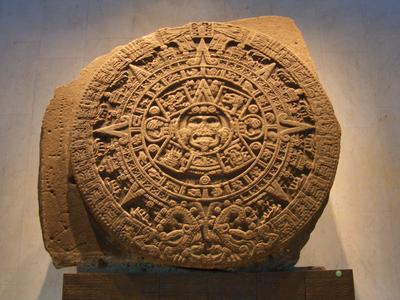 The artifacts, information, and presentation of Mexico's history was awe-inspiring. The guide book said it was one of the best museums of its kind in the world and it was certainly one of the best I've ever seen. I spent over five hours and saw only the first floor (two-storey building) and could've easily taken much more time. 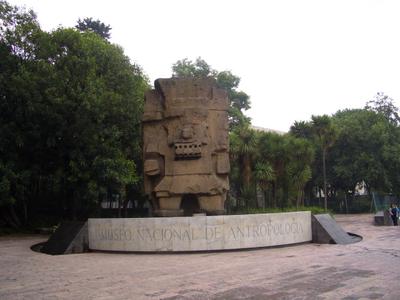 The other highlight of Mexico was...bungy jumping. That is me plummeting fifty-meters to the ground in sunny Acapulco. My very brave friend and co-jumper leapt before me. The deal being that I wasn't jumping unless he jumped....he jumped. The other highlight of Mexico was...bungy jumping. That is me plummeting fifty-meters to the ground in sunny Acapulco. My very brave friend and co-jumper leapt before me. The deal being that I wasn't jumping unless he jumped....he jumped.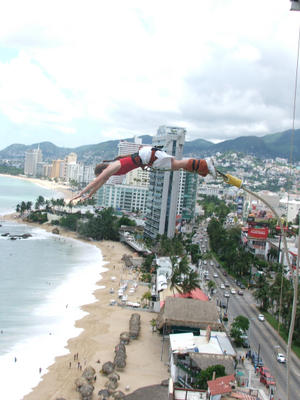 Other highlights in Mexico included trips to San Miguel de Allende, San Luis Potosi, and Taxco. Within Mexico City I visited Frida Kahlo's house, Trotsky's house, the Zocalo, and saw many a mural by Diego Rivera. Other highlights in Mexico included trips to San Miguel de Allende, San Luis Potosi, and Taxco. Within Mexico City I visited Frida Kahlo's house, Trotsky's house, the Zocalo, and saw many a mural by Diego Rivera.
Tuesday, August 16, 2005
North Korea Human Rights Regarding my plans to take some personal steps against the situation in North Korea, I wrote a letter and sent it out to all Queensland members from the House of Representatives and to the Senate. The contents of the letter are below and anyone and everyone is, of course, welcome to use any/all information to write their own letter, especially if it is to Australia's members of parliament: I will be updating any progress from the letters I will post and update future letters, steps taken to address the human rights situation in North Korea. Sunday, August 07, 2005
Recess! After a record-setting 13 days of "negotiations" the party of six have decided they need a break to recover. And deservedly so. Afterall, it took them 13 days to do what the other rounds achieved in only 2-3 days - arrive at a stalemate. Although, the phrase "light-water reactor plant" has resurfaced in the latest articles on the negotiations. Its like one of those bad movie sequels where the second movie is too much like the first movie. The recess is coming at a time when all sides should be reflecting on what nuclear weapons are capable of. Also, in recess time, keep an eye out for new US Ambassador to the UN - Mr. J. Bolton. Though I dislike his opinions and methods, I do agree with a Wapo editorital (which I can't immediately locate on-line) that noted that delaying tactics by Democrats in the Senate to prevent a vote that would have seen him confirmed was really just lining themselves up for this. Blocking a democratic vote because you know you are going to lose is not the answer. And fomer Foreign Secretary of UK, Robin Cook has died way too young. Only 59! Sunday, July 31, 2005
Thursday, July 28, 2005
Wolfowitz on G8 President Paul Wolfowitz and some senior Vice Presidents in the Bank held a forum today to discuss the G8 Summit in Gleneagles. Wolfowitz has released a statement. The forum was a bit like a talk show setting with Wolfowitz grabbing the mike and wandering over to those who wanted to add comments or ask questions. The questions were the usual, "how will debt relief help the poor man on the street?"; "how effective will debt relief from G8 be without similar relief from other donors?"; "how is the Bank planning to make sure we take advantage of the developments in G8 to boost our efforts to get real results in poverty reduction and economic growth in practice?"; "What about gender equality?"...you get the idea. All good questions and a lot of challenges and hard work ahead for the Bank. Belated Weekend Roundup Friday night the Kaiser Chiefs played at The 9:30 Club. There was some drinking and dancing before, during and after the concert and a good time had by all. Until I got in a thunder storm at two a.m. on the way home. At least I got to work off some of the beer calories by having to make a mad slightly staggering dash from metro to home. On Saturday I got up early (for a Saturday) and headed off with some friends to Sugarloaf Mountain. Wandering in the cool of the trees was a welcome break from the stifling heat of DC
And Sunday I made a trip to The Kennedy Center for the Six p.m. free concert of young musicians. They were amazing. Sunday, July 24, 2005
WHAT’S THE WORD ON KOREA: A REVIEW ON WRITINGS IN RECENT JOURNALS There are always articles covering a wide range of issues coming out about Korea. Predominant among the themes is the nuclear issue along with the six-party talks, non-proliferation, US relations to one or both of the Koreas, human rights and, perhaps less commonly, South Korean domestic policy. In the field of Korean studies there are a few core celebrities we can count on to produce quality work and we hope for new faces with some interesting takes. The National Interest,The Atlantic Monthly and The Washington Quarterly are my picks for the best writings on Korea on sale now. Starting with The National Interest, A-list celebrity in the field of Korean studies Nicholas Eberstadt of the American Enterprise Institute has a brief four-page article on, “North Korea’s Weapon’s Quest.” If you are familiar with Nick’s earlier writings and his recommendations for US policy this article is a must-skip. If you are not familiar as such, this is a good summary of his well-known position and arguments. The article re-covers Nick’s view of the pillars supporting and justifying the continued existence of the regime, i.e.: unification under North Korea's system, boot out the imperialist Americans, and preparation for the coming war, and goes on to link how these aims of nationhood fit with the North’s pursuance of nuclear weapons. This creates an overall picture of a regime that is not insane, but calculating and one that is logically pursuing a policy that will enable it to meet its objectives. As Nick states, “Despite the North Korean regimes seemingly freakish face to the world, the leadership’s ability to make subtle and skilful calculations is underscored by the bottom line negotiations with the US government over the past decade.” The conclusion is of course that given North Korea’s historical reasons for existing and its current objectives, negotiation is futile and possibly dangerous. Another appealing article in The National Interest is by Ted Galen Carpenter and Charles V. Pe?a entitled, “Rethinking Non-Proliferation.” Mr. Galen Carpenter is known for his recent book “The Korean Conundrum”, which he co-authored with Doug Bandow. I haven't read this book, but after reading this article it moved several notches up on my list of ‘to read’ books. The article starts off sanely enough by recognising that non-proliferation efforts do not appear to be working all that effectively at the moment and in fact, there are precedents that run counter to non-proliferation efforts. Reasons for failing to drive home a non-proliferation message include disingenuous actions of the US itself. Despite the best intentions that non-proliferation activism might have, the behaviour of the US “may seem threatening to nations that have a less than cordial relationship with the United States.” Failure in preventing proliferation was also credited to the counter-effective interpretation of events in Iraq by countries such as Iran and North Korea. And of course, examples of India, China, and Pakistan, all of which got improvements in their relations with the US after declaring themselves nuclear are cited as poor precedents for now standing up for non-proliferation. These arguments reminded me of Robert McNamara’s recent article in Foreign Policy. However, while Mr. McNamara advocated that all nukes need to be got rid of, Messrs Galen Carpenter and Pe?a went the opposite way advancing that proliferation ain’t such a bad thing. This point is argued by aligning non-proliferation rules to those of gun control ? strict gun control prevents peaceful people from getting guns to protect themselves, while the criminals get the guns regardless of the laws. That is to say, only the peaceful and stable countries like “Germany, Japan, Sweden and South Korea” are prevented from acquiring nukes while rogue regimes such as North Korea go on their merry way toward nuclearisation. Afterall, nukes don’t kill people, people kill people. This article would be funny if wasn’t so scary. In a country with possibly the laxest gun control laws in the world outside of war zones, and possibly the highest death rate by guns outside war zones, I don’t think US gun control policy is anything this world wants to follow when it comes to nuclear weapons. Most concerning is that the authors list of “stable democracies”. No nation is truly stable. I would hardly consider Taiwan to be a stable democracy, and South Korea for that matter. Even Japan which is currently having a revival of nationalism with the rise of right-wingers like Ishihara is hardly a stalwart of stability. And if you give all of them WMD at the same time, they are likely to lose their collective heads. All the more so if they think that the world’s most powerful military, the US, is backing them up. The argument also pressed that sale of technology and weapons to non-state actors would be a red line. However, the sale of technology by Pakistani rogue, Kahn and lack of any punishment proves how hollow and unworkable such an idea is. This certainly implies that the NPT needs to be better but its no argument for abandoning NPT. The Atlantic Monthly has a good commentary on the proceedings of a simulation ‘war game’ done concerning North Korea. The players were experts from various security, international policy, and academic backgrounds including Robert Gallucci famous for his role in devising the Agreed Framework, former IAEA nuke inspector David Kay, Lieutenant General Thomas McInerney, Jessica Mathew of the Carnegie Institute, and DoD guy Kenneth Adelman. It highlighted the key issues and presented the arguments that different positions with the government would push and points of view based on the players’ different backgrounds providing a big picture of the issues and arguments concerning the North Korea nuclear issue. The biggest concern, through consensus, was not the weapons as such but the threat of their sale to terrorist groups. The number of English articles on the divisiveness of domestic South Korean politics seems to be increasing. In TheWashington Quarterly Hahm Chaibong of Yonsei University provides an overview of the conservative versus progressives in Korean politics. It takes little discernment to see that Mr. Hahm is on the side of the conservatives. The bulk of the article is in the way of background on the rise of progressives to Korea’s political stage and is worth reading. The author characterises the progressives as anti-capitalist, anti-US, anti-Japanese, and pro-North. They are criticised for their anti-chaebol reforms undertaken during Kim Dae-Jung’s administration (which he indicates was only elected because of the turmoil created by the economic crisis) and its effect of Korea’s competitiveness. As for the Sunshine Policy, he argues that progressives’ view this policy as the best way to exclude the US from Korea’s pursuit of national self-determination. He argues that “infantile leftist nationalism … is wreaking havoc on South Korea’s economy and its alliance with the United States, the country’s two mainstays.” And as for their political future, “The progressives were able to enter the political mainstream because they were willing to make a pact with the devil by making strategic alignments with conservatives” and will continue to use “political rhetoric and ideology to manipulate selective affinity or confusion…to its advantage.” The following article in The Washington Quarterly is by Andrew Coe of the Institute for Defense Analysis. “North Korea’s New Cash Crop” is a great counter-argument to Ted Galen Carpenter and Pe?a’s article. Mr. Coe emphases the decline of the North Korean regime economy and analyses its sources of hard currency and recent trends in making more money. He concludes that from narcotics to counterfeiting, if the objective of the regime is to survive, then making money will be done by whatever means ? including weapons sales. Given this to be the case then, the potential are viewed for their attractiveness. Known buyers of North Korean arms include Egypt, Iran, Syria and Yemen. The potentials are listed as Tehran, Saudi Arabia, Taiwan and possibly Venezuela. And of course, a nod is given to the potential to sell to terrorist organisations. In this, Mr. Coe argues that it wouldn’t be a matter of the North having the “moral clarity” or fear for their own regime’s survival that would stop them from making such a sale but more likely, the terrorist organisations wouldn’t have sufficient funds to cut a deal. Friday, July 22, 2005
Conference on North Korean Human Rights, Washington DC July 19, 2005 For all the authoritative and comprehensive information on this event you need to go to One Free Korea. And as a further disclaimer I'm not involved in any organised charity on North Korean human rights and showed up merely as an interested and concerned person (not even a US citizen). Unlike "One Free Korea" I didn't have eleven pages of notes, I had a mere page and a half. And unlike OFK I do NOT consider starting 15 minutes late, breaks constantly eating into the sessions by 5-10 minutes and lunch that went half an hour longer than scheduled as being "like the Tokyo train system--on time, efficient". I would however, say that is was typical of conferences of this size and nature. 1. The Content The highlight was clearly Natan Sharansky and the testimonies of North Korean defectors and their helpers including Tim Peters and Rev. Chun Ki-Won. And kudos also needs to be given to the coverage which touched on conditions in Korean concentration camps, the plight of refugees in China, human trafficking and women's issues, and also Japanese abductees. This was further strengthened by the range of speakers which included charities and those directly affected, government - both US and South Korea, academia and church. There was no open floor Q&A during the conference. Although I regret this somewhat as I think it would've made it more interactive I also understand that the reason the schedule kept such clear focus was because it didn't open itself up to divergences that the audience may have taken us on. Also, with such a controversial issue, open floor may have gotten out of hand. 2. The Speakers As mentioned the defectors, Sharansky and Tim Peters were all very interesting to listen to. I should also put in Donna Hughes' account of human trafficking of women as among one of the best talks of the day. Senators Brownback, Leach and all the religious folks were good speakers per se but the constant dramatic pauses for gratuitous applauses was difficult to stomach. Deborah Fikes, Executive Director of the Midland Ministerial Alliance who claimed that the US government placed the genocide by Nazi Germany as a key reason US entered and fought in WWII needs to urgently read a basic history on the US government's approach and actions against genocide claims made during WWII. Even a simple trip to the Holocaust Museum may clear up some confusion for her. Dr. Kim Sang Chul of Save North Korea was fortunate not to have a coronary and as the audience it was a miracle we didn't all simultaneously blow our eardrums. Nobody knows what he said because he was screaming too much. In fact, of the speakers, the (mostly Korean and mostly religious) freaks who put on the afternoon show (3:30-5:00) where all too much for me to bear. I was planning to stay for the evening US politicians but couldn't stomach it anymore by this stage. The whole religious and political gang who kept on about "moral clarity" also started to get on my nerves as well. I don't need "moral clarity" to know that 2 million starving to death, execution for defection and concentration camps are "wrong". Frankly, that kind of term only serves to create a "holier-than-thou" attitude which will only serve to repel secular would-be activists. And praying is also a BIG NO in a conference. Being told to stand and hold hand has got to be the most off-putting turn of events I have ever encountered at a conference. About the speakers, I don't want to imply that the message was bad - indeed as mentioned the content was good and the topic is critical but the delivery at times made the SOME of speakers seem disingenuous. 3. The Audience This was a big crowd. Mostly Korean and, I'm guessing, predominantly involved or otherwise associated with either Freedom House of other charity groups that were taking part in the conference. As such, I viewed this event pretty much as a "preacher speaking to his choir" affair. I doubt that there were any among us who had not already read "The Aquariums of Pyongyang" and I'm guessing the majority had also read Sharansky's book. And like me who wrote only a page and a half of notes, I think the rest of the audience also heard very little that they didn't already know. 4. Conclusion My thoughts at the end of the conference were mixed. I'd had a gutful of politicians and preachers and was disappointed in the lack of new information but at the same time I was encouraged by the scope of people who were concerned about the issue and more convinced than ever that more needs to be done than simply holding conferences like this. My role in helping North Korea's people is not going to be served by attending these events or by joining groups like Freedom House but in my individual actions. Tuesday, July 19, 2005
South Korean Man Arrested for Trying to Smuggle Cocaine into Sydney I just heard this story on the radio. Lucky for this idiot Australia doesn't have the death penalty. Monday, July 18, 2005
Sigthseeing in Washington DC On Saturday I visited The Holocaust Memorial. This was a great museum except that they did not properly define the word "holocaust" and used the word "genocide" as if it meant "extermination", which it does not. Perhaps I was sensitive to the term due to the book I was reading but I agree with Ms. Powers that by setting the standard of genocide as equivalent to what happened to the Jews it becomes almost impossible to convince people to intervene before such a horrific level is realised. 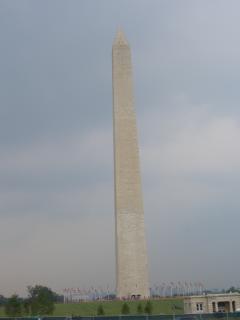 The Washington Monument The Washington MonumentAnd on Sunday, I made my way over to Arlington Cemetery. It was so stinking sweaty and humid I thought I was going to melt away but fortunately I survived. The most striking thing about this place, apart from being so quiet and picteresque in an eerie kinda way, is how large it is. This became more clear to me when I got lost and later realised I had only been wandering aimlessly through a very small section of the grounds. 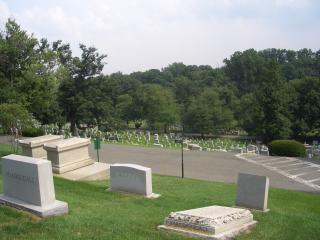 Arlington Cemetery Arlington CemeteryAnd so concludes my vacation. Tomorrow I'm back at work. Book Review "A Problem from Hell: America in the Age of Genocide" by Samantha Power Published in 2003 this book has long been on my reading list. Unfortunately my extensive "to read" list currently has a waiting period of 3-5 years before I get around to even priority books. However, I finally got around to reading this book and it is truly a powerful book. The most disturbing parts of the book, for me, was the inordinate amount of time it took for the US to even ratify the Genocide Convention. I checked Australia's own record on this as I was concerned that our deference to follow US lead may have made us equally shocking but thanks to Dr. Evatt Australia was among the very first, if not The first nation to ratify. Although what that has meant to Australia since ratification, I don't know. The other most disturbing part, for me, was US reaction to the Khmer Rouge in Cambodia during the Cold War. Although, I guess that my shock lies not in how US handled it, but in my own ignorance of the facts. Indeed for the Iraq, Rwanda and Bosnia, Sbrencia and Kosovo stories I was less shocked because I already knew the story. However, my shock over Cambodia quickly condensed into dissatisfaction, bordering on anger, as to my high school history education which blatantly has failed to educate me. Ms. Powers, whose bias is obvious in the book, outlines a clear argument against US apathy in its approach to genocide. She favours a more activist involvement in the future. Indeed, her name was listed at the Holocaust Museum in DC, which I visited on Saturday as having been recently to interview refugees in Darfur, Sudan to ascertain whether or not genocide was occurring. If there was any weakness in her argument it came during the Bosnia argument. In some cases she argued that a mere credible word from US would deter genocide but in Kosovo it was noted that even bombing was not credible enough in the first few days to be credible enough to deter. Although, it can be argued that the erosion of credibility through previous lack of action made even the bombing initially seem hollow. The complexity of the issue, in my mind, lies in the almost paradoxical idea that to prevent/stop genocide countries must use military force; ie: killing can only be stopped by killing - the crux of the matter lies in the "intent" of the killing. Saturday, July 16, 2005
Public Finance Symposium, Istanbul, June 6-8 For my recent trip to Turkey I did not write during the trip as I was too busy and ridiculously jet-lagged. I always thought people were so rude to sleep during conferences - if they are not interested they shouldn't come! However, for the first time I found myself guilty of this most impolite act. Not that I wasn't interested; my body simply shut down and no amount of caffeine was going to keep my eyes open. By the end of the conference though I worked out a few tricks to keep awake such as a brisk walk before the session out in the sun and taking notes of the session to keep body and mind active. At the end of the first day of the Symposium the Turkish counterparts took us all on a wonderful dinner cruise along the Bosphorus River. 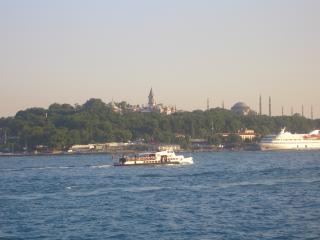 View from the boat on the Bosphorus View from the boat on the Bosphorus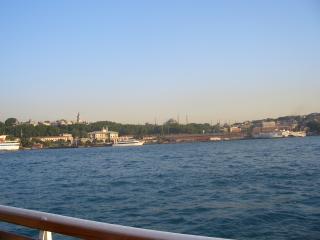 Another scenic shot Another scenic shot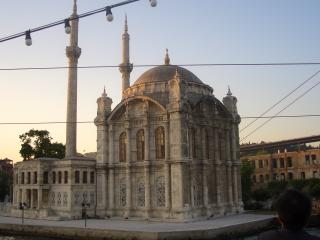 View of a palace from the boat View of a palace from the boatOn the final day, the conference ended after lunch giving my friend and me a full half day and evening to be proper tourists. We immediately set out to enjoy some sights. 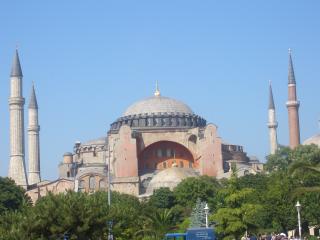 The Hagia Sophia The Hagia Sophia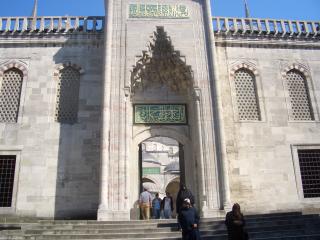 Outside the Blue Mosque Outside the Blue Mosque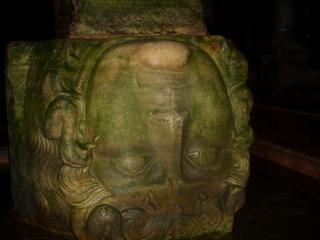 Upside down head of Medusa in the Basilica Upside down head of Medusa in the Basilica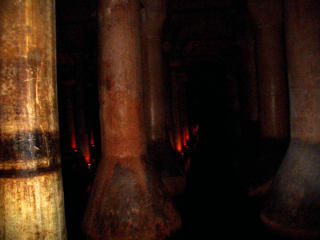 The Basilica The BasilicaAfter visiting the Blue Mosque, Hagia Sophia, and the Basilica we wandered the streets a while before having dinner and then finding a quaint little hof for a few too many beers. Visiting Lao and Turkey in quick succession highlighted how vastly different this world really is. These countries may as well be different planets but I loved them both and they both had a richness and beauty unique unto themselves. Friday, July 15, 2005
The Public Finance Workshop in Vientiane, Lao PDR Finally, I have time to get organised enough to post long overdue photos from my trips. Let me start with my mission to Lao in late May. While I was there, I attempted to write some goings on. Like most attempts in this regard, the attempt was aborted shortly after it began due to excessive workload and some degree of laziness. However, I will include what I did manage to write. It is only edited for typos but otherwise remains as I wrote it at the time. Mission to Vientiane, May 22-25 22 May 2005 I will, as I proceed, omit any work details as that is boring. So all the gaps in the schedule will indicate work time. Arrived in Lao PDR. Flying into Lao was enough for me to see that I had never been to a country quite like this. Descending into Vientiane, the capital, was like flying into a rural town, not a city. The very friendly and helpful staff from the Lao Plaza Hotel were waiting for me and two others to take us directly to the hotel via a shuttle bus. Riding along the streets showed people mostly on mopeds and tuk tuks zipping down the streets with seemingly very lax ideas of ??road rules.?? But traffic was light enough that the lack of organization seemed of little consequence. The first striking point was that not all the roads are paved in downtown Vientiane. The Lao Plaza Hotel is a quite lovely place. It does not have the luxury of some countries?? hotels but it is clean, has cable (currently watching a spot of Rugby Union on ESPN), a pool and gym area and other amenities expected of a nice hotel. On the afternoon of arrival a few of us took the car we have rented complete with a driver to take a tour around the city. This took very little time partly because one of the two tourist highlights was closed on a Sunday. The other place seemed closed too but doors were opened with a spot of dosh. We also drove past an impressive arch. Afterwards we took a walk by the Mekong River until we came to a known local hangout for tourists and expats by the river and enjoyed a Beer Lao, which is quite delicious and some squid and fried fish. Squid and fish because three of our group were Korean and what is beer without squid and fish, really? 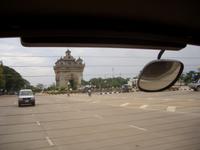 Impressive arch Impressive arch 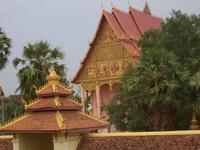 Sightseeing in Vientiane 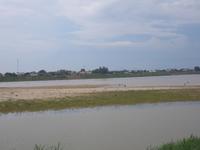 The Mekong River: opposite bank is Thailand The Mekong River: opposite bank is Thailand In the evening we had a light dinner in the hotel. They served up a massive plate of delicious food for a ridiculous price. This country is obscenely cheap ?? US$3 for something that would cost around US$20 plus tax in Washington. 23 May, 2005 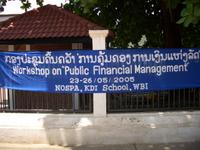 Banner announcing our presence Banner announcing our presenceFirst session of the workshop is about to start and the room is CROWDED! They are bringing in extra chairs to try and fit everyone in. This is great for the conference and is hopefully an early sign that it will be a big success. I have volunteered to take notes of the proceedings which has the added benefit of letting me blog as well. Also positive to note that there is a good representation of women among the participants. And so concludes my mission to Laos. There is a follow up workshop between the parties involved in improving public financial management in Laos that is due to be held in Seoul in September but whether or not I join that mission is very much uncertain at this stage. Fingers crossed.
|
Korea Blogs 
Newspapers |